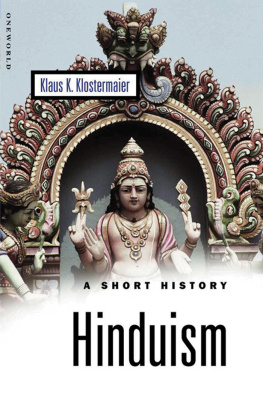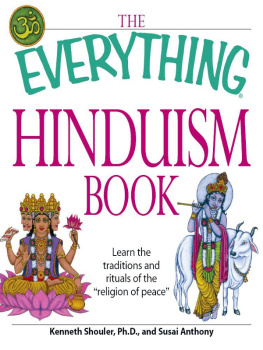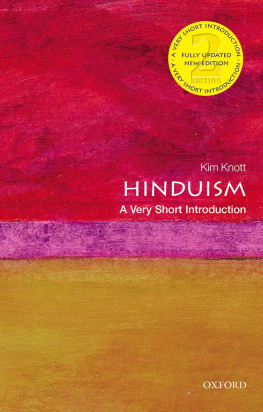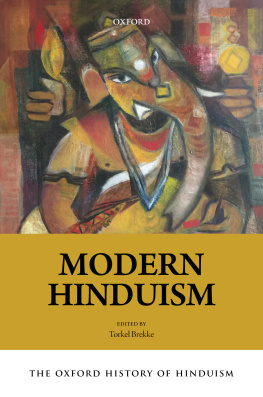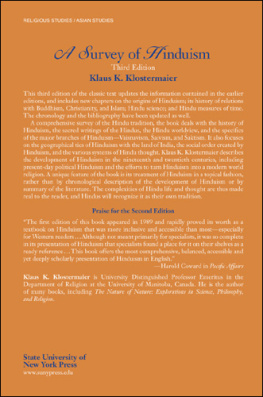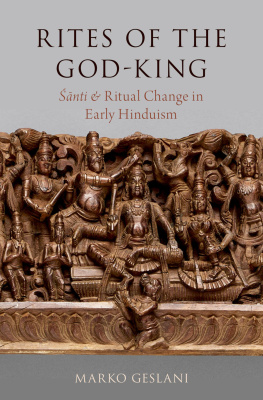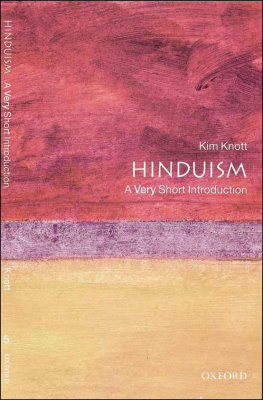Klaus K. Klostermaier - Hinduism: A Short History
Here you can read online Klaus K. Klostermaier - Hinduism: A Short History full text of the book (entire story) in english for free. Download pdf and epub, get meaning, cover and reviews about this ebook. year: 2000, publisher: Oneworld Publications, genre: Religion. Description of the work, (preface) as well as reviews are available. Best literature library LitArk.com created for fans of good reading and offers a wide selection of genres:
Romance novel
Science fiction
Adventure
Detective
Science
History
Home and family
Prose
Art
Politics
Computer
Non-fiction
Religion
Business
Children
Humor
Choose a favorite category and find really read worthwhile books. Enjoy immersion in the world of imagination, feel the emotions of the characters or learn something new for yourself, make an fascinating discovery.
- Book:Hinduism: A Short History
- Author:
- Publisher:Oneworld Publications
- Genre:
- Year:2000
- Rating:5 / 5
- Favourites:Add to favourites
- Your mark:
- 100
- 1
- 2
- 3
- 4
- 5
Hinduism: A Short History: summary, description and annotation
We offer to read an annotation, description, summary or preface (depends on what the author of the book "Hinduism: A Short History" wrote himself). If you haven't found the necessary information about the book — write in the comments, we will try to find it.
Hinduism: A Short History — read online for free the complete book (whole text) full work
Below is the text of the book, divided by pages. System saving the place of the last page read, allows you to conveniently read the book "Hinduism: A Short History" online for free, without having to search again every time where you left off. Put a bookmark, and you can go to the page where you finished reading at any time.
Font size:
Interval:
Bookmark:

Hinduism
A SHORT HISTORY
Hinduism
A SHORT HISTORY
Klaus K. Klostermaier

HINDUISM: A SHORT HISTORY
This ebook edition published by Oneworld Publications, 2014
First published by Oneworld Publicatios, 2001
Oneworld Publications
10 Bloomsbury Street
London WC1B 3SR
England
www.oneworld-publications.com
Klaus K. Klostermaier 2000
All rights reserved
Copyright under Berne Convention
A CIP record for this title is available
from the British Library
ISBN 978-1-85168-213-3
eISBN: 978-1-78074-680-7
Cover design by Design Deluxe
Stay up to date with the latest books,
special offers, and exclusive content from
Oneworld with our monthly newsletter
Sign up on our website
www.oneworld-publications.com
CONTENTS
PREFACE
H induism: A Short History is the second in a series that comprises Hinduism: A Short Introduction (Oneworld, 1998) and Hindu Writings: A Short Introduction to the Major Sources (Oneworld, 2000).
A History of Hinduism, with all the controversy that surrounds the very term Hinduism, and in the absence of a commonly agreed upon periodization of the intellectual development of India, is necessarily an interpretative construct, built on many assumptions. deals with the history of Hindu philosophy, which was always intimately connected with Hindu religion. The last chapter is devoted to Modern Hinduism, covering the new movements of the nineteenth and twentieth centuries; it also discusses the present situation and future prospects of Hinduism. A fairly extensive Glossary offers translations and explanations of Sanskrit terms used. The Select Bibliography documents the literature referred to, and offers suggestions for further reading in the history of Hinduism.
The book is intended for the non-specialist reader. However, ample documentation has been provided with numerous references both to original sources and to scholarly literature, which will enable the serious student to follow up the issues mentioned. Hindu source literature available in original languages and in translations, as well as secondary literature on Hinduism, in a great number of modern languages, has become extremely vast. Rich resources for the study of each and every aspect of the history of Hinduism mentioned in this book are available today to continue reading for an entire lifetime.
Gratitude is due to all the scholars whose work has been made use of, as acknowleged. Special thanks to Harold Coward (University of Victoria) for numerous detailed suggestions for improvement of the typescript. My thanks also extend to the friendly and efficient staff of Oneworld Publications, Oxford, for their unfailing courtesy and cooperation.
Klaus K. Klostermaier
Winnipeg, August 1, 1999
INTRODUCTION
WHAT IS HINDUISM?
H induism is unlike any of the other major historic religions. It does not claim an identifiable human founder or a specific origin in history some Hindus derive their tradition from a primeval revelation of the Supreme, others consider it the beginningless santana dharma, the eternal law that governs everything, independently of any divine or human agent nor has it ever rejected a parent tradition from which it separated as a rebel child, as all others have done. Hindus had not found it necessary to define the essentials of Hinduism or prove it different from other religions until challenged by break-away spiritual movements like Buddhism or invaders from outside, who wanted to impose their own religions, such as Islm and Christianity.
Traditional Hinduism has preserved surprisingly much of the character of autochthonous native traditions, maintaining the holistic, all-embracing approach typical of these: there is no hard and fast distinction between the sacred and the secular, no strict separation of religious ritual from essential daily activities, no real difference or tension between religion and culture.
The various branches of what became known as Hinduism do not have a common creed and they do not demand from their followers any declaration of a Hindu faith. Until recently one could not become a Hindu unless one was born into a Hindu family; and one could not cease to be a Hindu if one was born a Hindu. As far as ones membership in the Hindu community was concerned, it did not matter what one thought or believed as long as one participated in the traditional rituals, which were also part and parcel of traditional Indian culture. On the other hand, many of the sapradyas, specific worship traditions within Hinduism, draw very close and narrow boundaries: those who wish to be members must obey a very strict regimen with regard to diet, life-style, reading, and worship; they must not accept the teachings of any other sapradya, or read books or listen to sermons from them.
Left to itself the large and old Hindu civilization quietly appropriated whatever was brought into it from the outside, absorbed it, transformed it, and made it part of its own. That process of assimilation was disturbed in a major way first by the massive onslaught of Islamic conquerors from the tenth century C.E. onwards. The Muslims came to conquer India and to covert the native idolaters to their own religion. The rigid monotheism of Islam, the exclusivity claim of Mohammeds revelation, the rejection of the caste system proved irreconcilable with the native religio-cultural traditions of India.
While Islm could claim partial successes for over half a millennium most of India was under Muslim rule and a third of the population accepted Islm it generated a resistance among Hindus who began to realize an identity of their own based on their native Hindu traditions. Not by accident was it that from the eleventh century onwards nibandhas were composed encyclopedic works that collected Hindu legal traditions, information about Hindu holy places, Hindu rituals, and customs of all sapradyas. Hindus became aware of Hinduism as distinct from Islm. Islamic hostility toward idolatry further served to underscore the differences between Hindu traditions and other religions.
The second major disturbance was created by Western European powers from the sixteenth century C.E. onwards. While the main interest of the Portuguese, the Dutch, the Danish, the French and the English all of whom established colonies in India was trade, they were soon persuaded by the ecclesiastical powers of their homebases that they also had a duty to spread their Christian faith among the heathen.
Notwithstanding the presence of significant groups of indigenous Christians, who had lived for centuries peacefully side by side with their Hindu neighbors,
Others deny historic validity to the very notion of Hinduism prior to nineteenth century Neo-Hinduism, which arose as a reaction to Christianity, the religion of the foreign colonizers.
The global designation Hinduism is apt to disguise the great diversity of Indian religious traditions. Till very recently Hindus defined their religious identities by using specific appellations like Vaisnava, aiva, kta, Smrta etc., and several modern movements like the Rmakrishna Mission and the International Society for Krishna Consciousness emphatically denied being Hindu, so as not to be identified with other branches of Hinduism that hold beliefs contrary to their own.
THE MEANING OF HISTORY
There is an uncanny resemblance between the original Greek word historia
Font size:
Interval:
Bookmark:
Similar books «Hinduism: A Short History»
Look at similar books to Hinduism: A Short History. We have selected literature similar in name and meaning in the hope of providing readers with more options to find new, interesting, not yet read works.
Discussion, reviews of the book Hinduism: A Short History and just readers' own opinions. Leave your comments, write what you think about the work, its meaning or the main characters. Specify what exactly you liked and what you didn't like, and why you think so.

